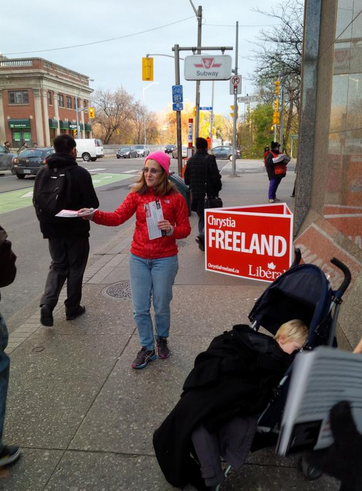People
Chrystia Freeland in the rough and tumble of Toronto politics
Sunday 17 November 2013
 Chrystia Freeland, who quit as Reuters’ New York-based managing director and editor of consumer news in July to try for a seat in the Canadian parliament, has quickly discovered how rough the rough and tumble of Toronto politics can be.
Chrystia Freeland, who quit as Reuters’ New York-based managing director and editor of consumer news in July to try for a seat in the Canadian parliament, has quickly discovered how rough the rough and tumble of Toronto politics can be.
Campaigning (photo) on a platform of restoring the middle class, she has been criticised for a Thomson Reuters decision to move about two dozen media jobs from Toronto to Bangalore in December 2011.
Her reaction to the criticism was robust. “Ever since I’ve been an editor at different news organizations, legacy newsrooms have been shrinking, and that was something that happened as well when I was at Reuters,” she said. “That shrinkage started before I got there and has continued. We know that is something that’s happening to the news business.”
Freeland is a Liberal party candidate seeking a seat in the House of Commons in Toronto Centre, one of four federal by-elections set for 25 November. She is an economic advisor to party leader Justin Trudeau. Her rival for the seat is another journalist who champions the middle class, Linda McQuaig.
“Liberals know that if we don’t address this growing anxiety today, Canadians will stop supporting a growth agenda - a threat to a core Canadian ideal that prosperity is a realistic goal for all Canadians,” states Freeland’s campaign website. “The time for investing in a thriving middle class is now - make your voice heard in Ottawa.”
Canada’s national news agency, The Canadian Press, reported: “Multiple sources from the defunct Toronto digital operation spoke to The Canadian Press, but few wanted to comment on the record for fear that criticizing the well-connected Freeland could hurt their employment prospects in a shrinking media industry.
“A common refrain from former Reuters employees is a sense that Freeland didn’t go to bat for them when their jobs were on the line.”
CP reported: “Aviva West spent three years as a full-time, contract editor who worked every weekend at the Toronto operation.
“We had zero contact with (Freeland),” said West.
“She was in charge of consumer news, and that’s what we were doing in Toronto, programming 24 hours a day, 365 days a year, Reuters.com. We never, ever saw her.”
“We wanted to show her what we did because we worked really hard on this site, we loved our jobs and we wanted to show her the value that we added to the company,” said West. “But we never got that chance.”
“Said another former editor, who requested anonymity to protect her future employment prospects, ‘Campaigning for the middle class is just so hypocritical.’”
Barb Burg, Reuters global head of communications, said in an e-mail to CP: “I can confirm that the decision was not Chrystia Freeland’s. It was a corporate one that resulted from extensive financial review and changing customer needs.”
CP said a senior source with knowledge of the decision-making process put it this way: “It was a corporate decision that she executed." ■
- « Previous
- Next »
- 416 of 578